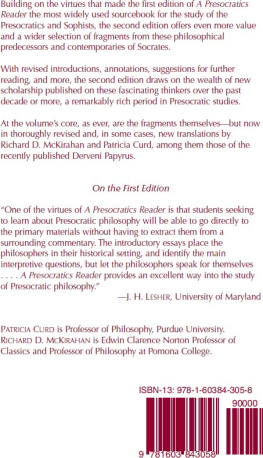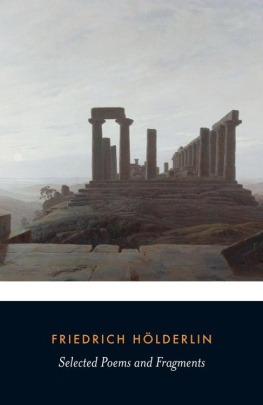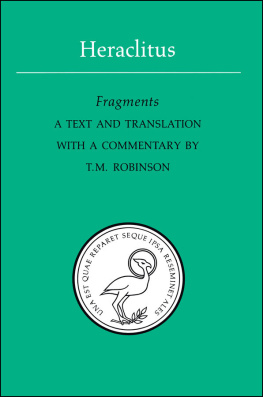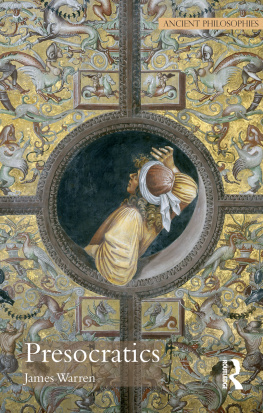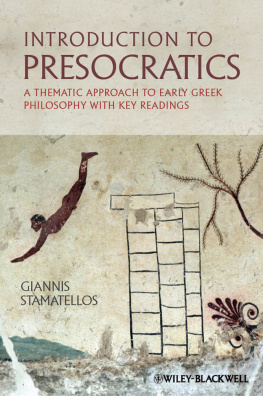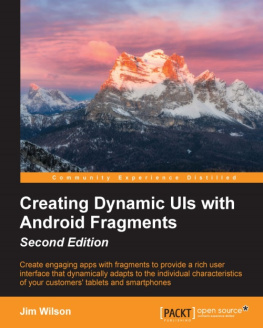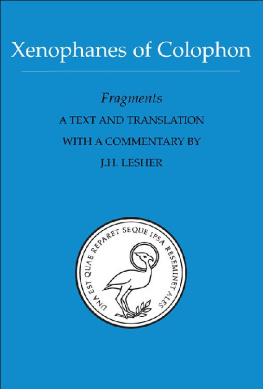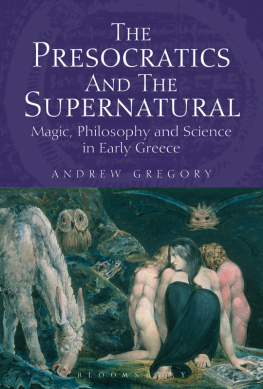Curd - A Presocratics reader selected fragments and testimonia
Here you can read online Curd - A Presocratics reader selected fragments and testimonia full text of the book (entire story) in english for free. Download pdf and epub, get meaning, cover and reviews about this ebook. City: Vancouver;BC, year: 2012;2015, publisher: Hackett Publishing Company, Inc.;Curd, Patricia, McKirahan, Richard D;Crane Library, genre: Religion. Description of the work, (preface) as well as reviews are available. Best literature library LitArk.com created for fans of good reading and offers a wide selection of genres:
Romance novel
Science fiction
Adventure
Detective
Science
History
Home and family
Prose
Art
Politics
Computer
Non-fiction
Religion
Business
Children
Humor
Choose a favorite category and find really read worthwhile books. Enjoy immersion in the world of imagination, feel the emotions of the characters or learn something new for yourself, make an fascinating discovery.
- Book:A Presocratics reader selected fragments and testimonia
- Author:
- Publisher:Hackett Publishing Company, Inc.;Curd, Patricia, McKirahan, Richard D;Crane Library
- Genre:
- Year:2012;2015
- City:Vancouver;BC
- Rating:5 / 5
- Favourites:Add to favourites
- Your mark:
- 100
- 1
- 2
- 3
- 4
- 5
A Presocratics reader selected fragments and testimonia: summary, description and annotation
We offer to read an annotation, description, summary or preface (depends on what the author of the book "A Presocratics reader selected fragments and testimonia" wrote himself). If you haven't found the necessary information about the book — write in the comments, we will try to find it.
Curd: author's other books
Who wrote A Presocratics reader selected fragments and testimonia? Find out the surname, the name of the author of the book and a list of all author's works by series.
A Presocratics reader selected fragments and testimonia — read online for free the complete book (whole text) full work
Below is the text of the book, divided by pages. System saving the place of the last page read, allows you to conveniently read the book "A Presocratics reader selected fragments and testimonia" online for free, without having to search again every time where you left off. Put a bookmark, and you can go to the page where you finished reading at any time.
Font size:
Interval:
Bookmark:
A PRESOCRATICS READER
Second Edition
A PRESOCRATICS READER
Selected Fragments and Testimonia
Second Edition
Edited, with Introduction, by
PATRICIA CURD
Translations by
RICHARD D. MCKIRAHAN
and
PATRICIA CURD
Hackett Publishing Company, Inc.
Indianapolis/Cambridge
Copyright 2011 by Hackett Publishing Company, Inc.
All rights reserved
Printed in the United States of America
14 13 12 11 1 2 3 4 5 6 7
For further information, please address
Hackett Publishing Company, Inc.
P.O. Box 44937
Indianapolis, Indiana 46244-0937
www.hackettpublishing.com
Cover design by Listenberger Design & Associates
Interior design by Dan Kirklin
Composition by William Hartman
Printed at Victor Graphics, Inc.
Library of Congress Cataloging-in-Publication Data
A Presocratics reader : selected fragments and testimonia / edited,
with introduction, by Patricia Curd ; translations by Richard D.
McKirahan. 2nd ed.
p. cm.
Includes bibliographical references.
ISBN 978-1-60384-305-8 (pbk.) ISBN 978-1-60384-306-5 (cloth)
1. Philosophy, AncientSources. 2. Pre-Socratic philosophers.
I. Curd, Patricia, 1949 II. McKirahan, Richard D.
B187.5.P75 2010
182dc22
2010019297
ePub ISBN: 978-1-60384-764-3
A Presocratics Reader began as a revised and expanded version of the first section of Readings in Ancient Greek Philosophy (Hackett, 1st edition 1995). For a number of reasons, this is an excellent time to prepare a new edition of the Reader, and most of the changes will be incorporated into the next edition of Readings in Ancient Greek Philosophy.
Since 1995 and 1996 when this volume was put together, Presocratic studies have grown rapidly. Exciting new material has been discovered: the Strasbourg Papyrus with its previously unknown lines of Empedocles, and the Derveni Papyrus, which shows how Presocratic philosophy was adopted into the wider intellectual world of ancient Greece. There have been new studies published, and numerous international conferences: scholars have asked novel questions, and offered fresh interpretations. In this new edition, I have revised all of the introductory material (in many cases to take advantage of recent interpretations), and have included much of the new material (especially on Empedocles) that has come to light. The fragments in the Heraclitus and Empedocles chapters have been reordered, and the chapter on the Sophists has been changed in order to provide longer selections and a view of the Sophists more in keeping with contemporary scholarship. Finally, this edition includes the text of the intriguing Derveni Papyrus.
For A Presocratics Reader, the most important development has been Richard D. McKirahans complete revision of his excellent volume, Philosophy Before Socrates, for its second edition. The translations from this new edition of Philosophy Before Socrates form the backbone of A Presocratics Reader, and in revising this little book, I have had the advantage of working through the new material and corresponding with Professor McKirahan. Suggestions from those who have used A Presocratics Reader (including students and colleagues here at Purdue University) have been very helpful, and I have tried to incorporate as many of them as possible.
This collection is meant as a sourcebook of moderate length; it is not a complete collection of the fragments and testimonia for the figures included here. My aim has been to provide a good selection from the early Greek philosophers, along with some of the ancient reports about them, with minimal editorial intrusion. I have strong views about many issues in Presocratic philosophy, but I have refrained from imposing them on the reader. Those who want more scholarly intervention should consult the suggested readings at the end of each section. These readings (some introductory and some more advanced) will offer interpretations, arguments, and further references so that anyone beginning here can quickly enter the world of Presocratic scholarship.
In the last two years I have worked with Richard McKirahan as he was preparing the second edition of Philosophy Before Socrates. He allowed me to use a version of the new text in a seminar with upper-level undergraduates and graduate students at Purdue University, and we discussed many questions of translation and interpretation. As always, I have learned much from Richard, evenand perhaps mostlywhen we disagree. (I am happy to note that over these years we have come to have more agreements.) I am grateful for his comments and suggestions on my work over the years, including this project. I have also benefited from the Pythagorean expertise of Professor Carl Huffman, to whom I extend thanks.
The editors at Hackett Publishing have supported Readings in Ancient Greek Philosophy and A Presocratics Reader from the beginning, and I am grateful to them, and especially to Brian Rak and Liz Wilson.
ON ABBREVIATIONS
AND NOTES
The standard text collection for the Presocratics is H. Diels and W. Kranz, Die Fragmente der Vorsokratiker (6th edition, Berlin, 1951, and later printings), commonly referred to as DK. This collection has defined the scholarly conventions for referring to Presocratic texts, whether in Greek, Latin, or a modern translation. For each Presocratic philosopher DK assigns an identifying number: for example, Heraclitus is 22 and Anaxagoras is 59. DK uses the letter A to indicate testimony from ancient sources about that person, and the letter B to refer to what are taken to be direct quotations from that figures work. These quotations are also referred to as the fragments, since all we have are small sections from longer works. Furthermore, DK identifies the testimonia and fragments by unique numbers. Thus text identified as 22A2 refers to Heraclitus (22) testimony (A) number two (2); and text identified as 59B12 refers to Anaxagoras (59) fragment (B) number twelve (12).
In this volume, DK numbers (where available) accompany every quotation; when all the passages in a chapter come from the same section of DK, the particular Presocratics identifying number (22 or 59 in the examples just given) is listed only for the first passage. Hence fragment 1 from Anaxagoras will be identified as (59B1) and fragment 12 as (B12). Where texts come from more than one section, complete identifying DK numbers will be used as appropriate. In all cases, the source of the testimony or fragment from which DK drew the text appears at the end of the passage. For those texts that are not included in DK, the standard textual identification for the source is given along with the indication not in DK. Where proper names follow textual references, the reference is to the editor of the standard edition of the relevant text. For example, in the Heraclitus chapter, the entry Proclus, Commentary on Platos Alcibiades I 117, Westerink following selection 8 (B104) indicates that the fragment comes from Proclus Commentary on Platos Alcibiades I, and can be found on p. 117 of L. G. Westerinks 1954 edition of the text. References to two major papyrus collections use the standard abbreviations P.Herc. and P.Oxy.
Unless otherwise indicated, translations are by Richard D. McKirahan. In the few places where I have modified his translations, tmpc appears in the source identification line; where I have translated the entire passage, tpc appears. All of the translations in Chapter 9 (Anaxagoras) are mine.
Notes on the texts are scattered throughout this collection. Notes from the translator (McKirahan) are marked as such; all other notes are mine.
Finally, in the translations of quoted passages from ancient authors, I use a system of brackets:
Next pageFont size:
Interval:
Bookmark:
Similar books «A Presocratics reader selected fragments and testimonia»
Look at similar books to A Presocratics reader selected fragments and testimonia. We have selected literature similar in name and meaning in the hope of providing readers with more options to find new, interesting, not yet read works.
Discussion, reviews of the book A Presocratics reader selected fragments and testimonia and just readers' own opinions. Leave your comments, write what you think about the work, its meaning or the main characters. Specify what exactly you liked and what you didn't like, and why you think so.

